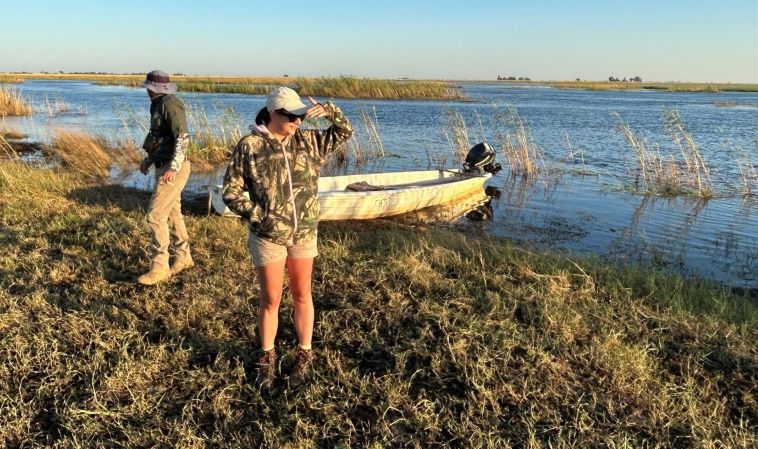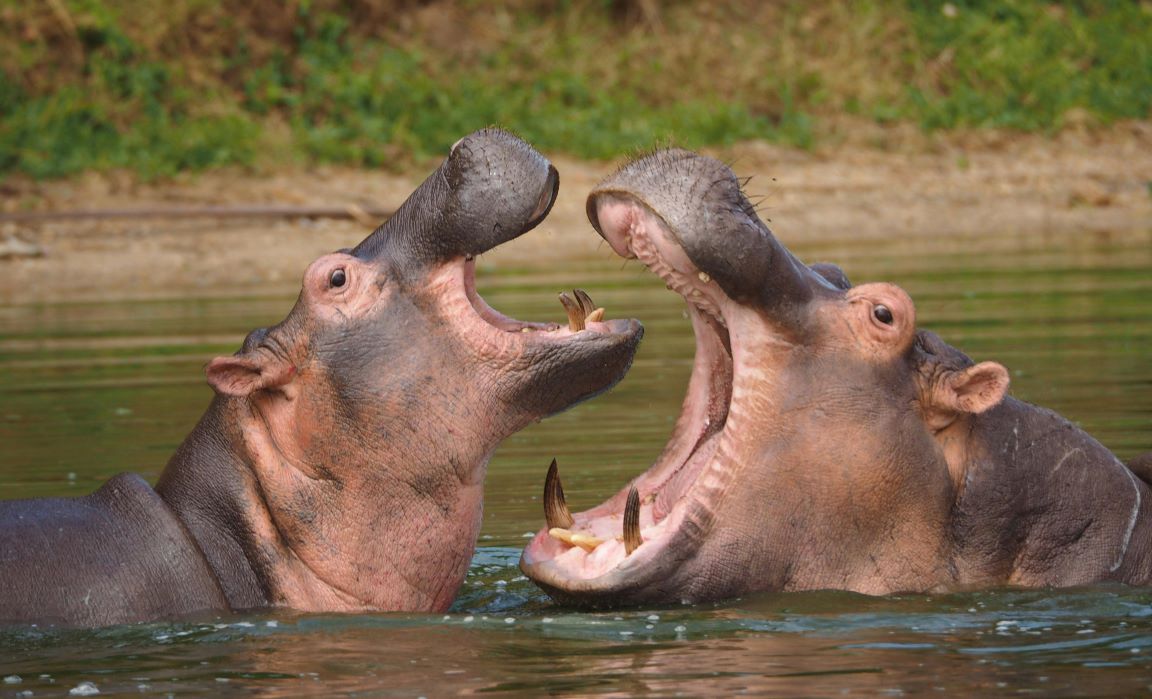Hippo hunts in Africa are a thrilling dangerous game hunting activity for seasoned hunters looking for a new hunting adventure to challenge themselves.
[DYNAMIC-BLOGTABLEOFCONTENT]
Key Takeaways
- Hippo hunts are action-packed dangerous game hunting safaris, targeting the continent’s famous “water horse.”
- Hippos are hunted for their tusks, measuring up to 50 inches.
- A minimum of a .375 caliber rifle is needed when on a hippo hunt.
- Hippos are challenging to hunt, requiring patience and excellent shot placement from the hunter.
- Hippos are generally hunted on land, or in the water, with pros and cons for both hunting scenarios.
- Hippos are hunted for their hides, ivory, and meat.
- Hippos remain dangerous animals and are annually responsible for the deaths of more than 600 African inhabitants.
- Hippos can be hunted in Namibia, South Africa, Zambia, Zimbabwe, Mozambique, Tanzania, and Uganda.
- The best time to enjoy a hippo hunt is during the drier months of April to August.
- Many hunters have already targeted Africa’s Big 5 but now need a new challenge that they find in hunting hippos.
- Hippos are often hunted in conjunction with crocodiles, as they share the same habitat.
Over recent years the international hunting industry has seen a shift in demand for African Hippo hunts. Big game hunting safaris for this member of the dangerous 7 is certainly on the increase as more hunters want to take on Africa’s third largest land mammal.
Hippo hunts are adrenaline filled and action packed, and these worthy adversaries are not afraid to use their razor-sharp tusks which can measure over fifty inches when removed from their enormous skulls.
There are few African predators who would take on a fully mature, dangerous and aggressive Hippo. The only way to survive if being caught between a charging Hippo and the chosen destination would be to either rapidly ascend a tree or place a bullet into the brain between the eyes.
For more information on this dangerous game animal you can read about hunting dangerous game.
Frequently Asked Questions
What is the best Hippo Hunting Caliber?
The best caliber to for Hippo hunting would be a minimum of a .375 caliber loaded with 300 grains of quality bullets, built for penetration.
Are Hippos Endangered?
While the Hippo is not endangered, a Hippo is listed as vulnerable a vulnerable species.
How many Hippos are left in the wild?
According to the IUCN (International Union for Conservation of Nature), Hippo populations are estimated at between 115000 and 130000 individuals.
What are the current Hippo hunting prices?
The most affordable African hunts for Hippo will are in the southern African countries of South Africa, Namibia and Mozambique.
A Hippo hunting safari will cost between US $10000 and US $12000.
Are Hippos hard to hunt?
Yes, Hippo hunts can be exceptionally difficult, and the large herbivores spent many hours in submerged in deep water, watching the African landscape with their beady eyes.
Why are Hippos hunted?
Trophy Hippo bulls are hunted for their ivory and hides. Hippos are also hunted for their meat. A harvested bull Hippo can supply more than a ton of meat.
Is Hippo hunting Dangerous?
Yes, the Hippo is exceptionally dangerous, and it is estimated that Hippo kill more than 600 people in Africa every year.
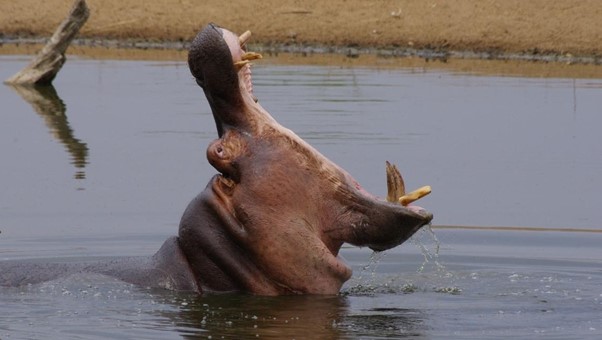
When on an African Hippo hunt, what is the best other species to include?
A hippo hunting safari often includes allowance to add on a trophy bull crocodile as a specialty safari. Crocodile hunting is done in conjunction with Hippo as these two dangerous 7 members occupy the same habitat and waterways.
Where are the best Hippo hunts in Africa?
Hippo hunts are conducted in many African countries, namely:
- Namibia
- South Africa
- Zambia
- Zimbabwe
- Mozambique
- Tanzania
- Uganda
Popular locations for African Hippo hunts include:
- The Zambezi Region (formally known as the Caprivi Strip)
- Lake Kariba
- Lake Cahora Basa
When is the best season for Hippo Hunting in Africa?
The preferred season for Hippo hunting is during the dryer months which are between April and August. During the hotter and wet seasons, the volume of water increases throughout the flood plains and waterways resulting in the Hippo’s being spread out occupying bigger territories. In the hotter months, Hippos also spend more time in the water to cool down and stay out of the harsh African sun.
The Importance of Shot Placement when Hippo hunting in Africa
While the Hippo is an enormous animal weighing up to 4000 pounds, in order to execute the perfect kill shot the hunter has to be able to shoot with extreme accuracy.
The Trophy Hippo will present the hunter with two possible scenarios as the Hippo will either be in the water, or our feeding on dry land. Depending on each scenario, the hunter could consider choosing between a rifle with a scope for pinpoint accuracy, or a larger caliber open sights such as a .416 Rigby or a double rifle.
Trophy Hippo in the Water
The only choice the hunter will have is a direct brain shot. From the front, straight between the eyes and from the side, between the ear and the eye. Failure to hit the brain will result in the Hippo either being knocked unconscious or escaping into the depths.
Another possibility should the Hippo present the hunter with the opportunity would be a neck shot shattering the spine and vertebras. Due to the Hippos thick neck, your professional hunter will not advise the hunter to take this shot, unless circumstances are dire.
Trophy Hippo out of the Water
This would be the preferred shot. From the broadside, aim up the front leg, a third of the way up and a well-placed bullet will enter the heart and ensure an ethical and humane kill shot.
From the front, the hunter will not have an option in the heart due to Hippos’ enormous head size. Should the Hippo be wounded and run, the hunter can attempt a backup “fleeing shot.” Aim at the juncture of the tail into the back and hope to hit the spine or aim at the left or right leg joint in order to immobilize the beast. Shot placement on a Hippo needs to be accurate.
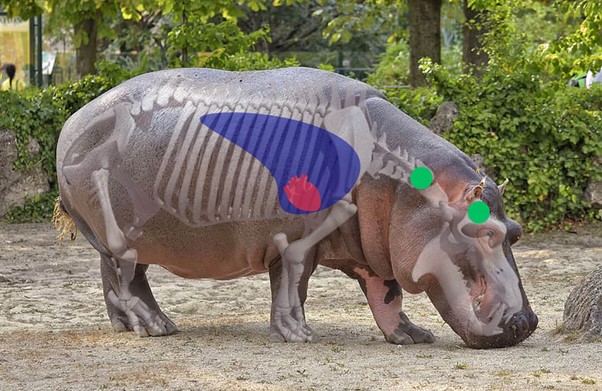
Why more international hunters are choosing the Hippo when considering African hunts
Historically, Africa’s main safari hunting attractions was successfully hunting the big five, namely the African Elephant, Rhino, Cape Buffalo, Lion and the Leopard. Hunting these dangerous animals was always considered to be the ultimate and most dangerous hunting adventure.
Hunters are realizing just how dangerous, exciting and rewarding Hippo hunts are. With international financial markets always being so volatile and individuals are under financial pressure, some of these big five animals are just not affordable anymore. The reality that a Hippo hunt in Africa, while packed with excitement is affordable value for money. A hippo or crocodile also makes a fantastic trophy and is a necessity in any big game trophy room.
Hippo hunts can also be combined with one of the all-time favorites, Africa’s Black Death, the Cape Buffalo. To add a Cape Buffalo to the Hippo hunting safari, the trophy price will be levied separated and will cost the hunter and additional US$ 5000 US $6000.
Certain countries have now also banned the importation of Lion and Elephant trophies.
Namibia, is a prime big game hunting destination offering all five of the big 5 animals, including the Black Rhino. The below chart illustrates the hunting safari costs per animal category hunt in Namibia. It is noted that certain safaris, like Elephant hunting, are for a longer duration of time.
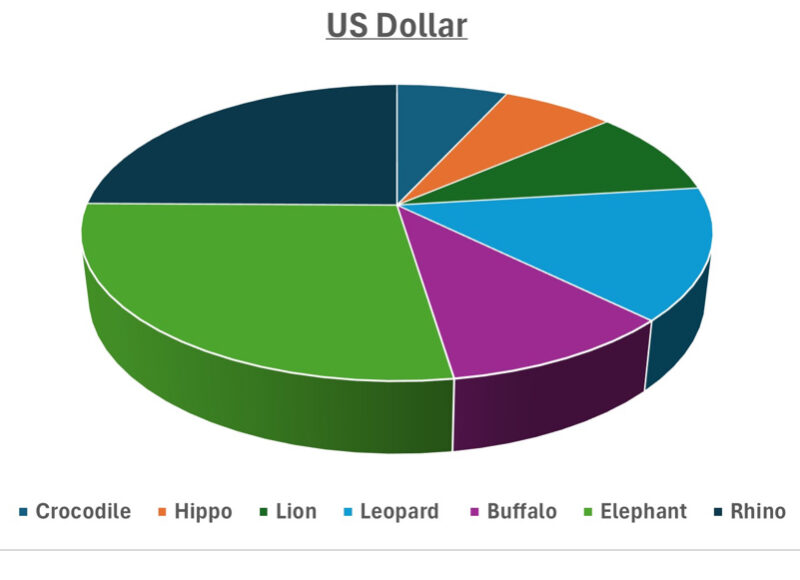
Economic Contributions by Big Game Hunters visiting Africa
Big Game Hunting in Africa is Big Business. African countries receive hundreds of millions of Dollars every year as a direct result of trophy hunting. In Africa, it is all rather simple, “if it pays, it stays.”
Thousands of jobs are generated as a direct result of these financial proceeds which include:
- Direct Marketers and Social Media Experts
- Accountants and Back Office Administrators
- Outfitter Personal: Skinners, Trackers, Chefs, Maintenance Staff and Drivers
With unemployment in African countries ever on the increase, economies are reliant on these cash flow contributions to balance the books.
Hippo Hunting in Africa, a huge contribution to Wildlife Conservation
Some people, people being the “greenies” deem big game hunting to be nothing but a cruel, unethical and unnecessary practice. As all hunters know, game hunting is the “back bone” of Wildlife conservation.
It is factually known, while the uneducated continue to deny, that hunters do more to assist wildlife conservation than any other group of people. Game hunters play an important role in assisting with not only problem animals, but help governments manage the size of certain Hippo populations. An overabundance of Hippo populations van threaten the well-being of other species inhabiting the same geographical areas.
Regulated Hippo hunting is one of the most effective tools of wildlife conservation.
African Hippo hunts near the end of season often become available and marketed as “Discount Hunts.” African outfitters are not always able to sell their Hippo hunting tags during the season and work on a “use it or lose it policy.”
These Hippo hunting safaris are good value for money, however often the hunter needs to be able to travel at short notice to seize the opportunity.
If space is an issue in the trophy room, Africa hunts specially aimed at non-exportable trophies are also available. The hunter gets to enjoy a successful Hippo hunting safari, but the trophy Hippo may not be exported. Proceeds from the harvest all goes to the local community development and upliftment programs who are generally in dire need of aid.
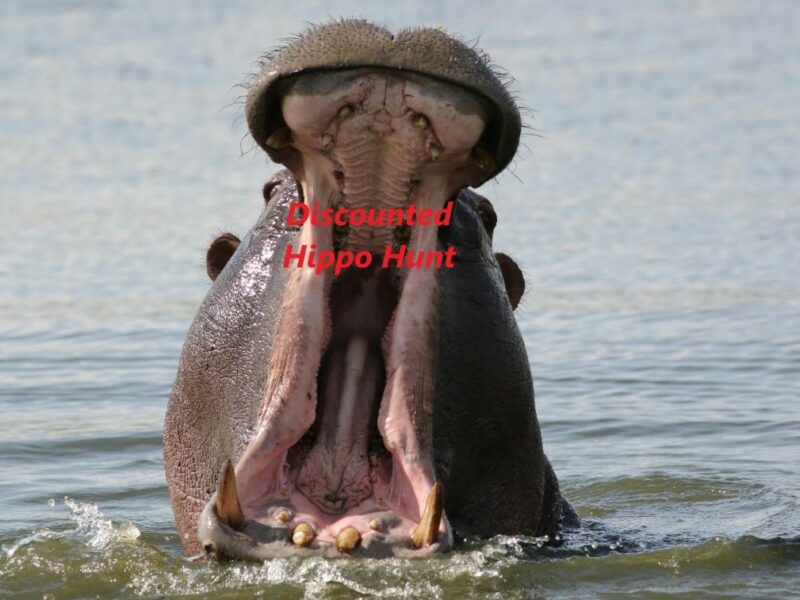
Hippo Hunts and Community Benefits
In order for Hippo safari hunts to be effective and deliver world class service, assistance is required from the local communities who work hand in hand with African outfitters.
Local residents fully understand the contributions and benefits as a direct result of Hippo hunting safaris. Outfitters will employ community members in key support roles such as spotters, trackers, skinners, cleaners and cooks.
Community members will also assist with tracking the movement of certain big game animals and will communicate any sightings, fresh spoor, community encounters with the outfitter and hunting client providing much needed “intel.”
The proceeds from Hippo hunting safaris also assist with providing improvements to the rural settlements by contributing and supplying solar power, bore holes for clean drinking water and much needed infrastructure. Hippo hunting safaris also contribute to medical facilities and schooling in these rural area. Only a hunter or observer who has travelled to these settlements can fully understand the appreciation that these residents have for contributions received as a direct result of these Hippo hunting safaris.
A few years back we were on safari Hippo hunting in Namibia. The local communities received all the meat proceeds and assisted with the recovery of the Hippo from the waterways in the Zambezi Deta.
While sitting back that evening and celebrating with a cold beer (OK, a good few cold beers), Tamlyn turned around and said, “You know, we did not only just successfully manage to hunt a Hippo, but as a direct result of this safari, we have in fact fed hundreds of people.”
It was a delight to see all the fires burning, the smell of Hippo meat being grilled over the open flame and while listening to the singing and celebrations from all the community members.
The following morning, we walked down to see what was left of the Hippo carcass. If it were not for the red blood stain, we would have never guessed a Hippo had been harvested. Every fence we encountered was laden with freshly salted Hippo meat, drying and ready for stock piling to assist with the tough months ahead.
Hippo hunting in Africa is a privilege and a humbling experience.
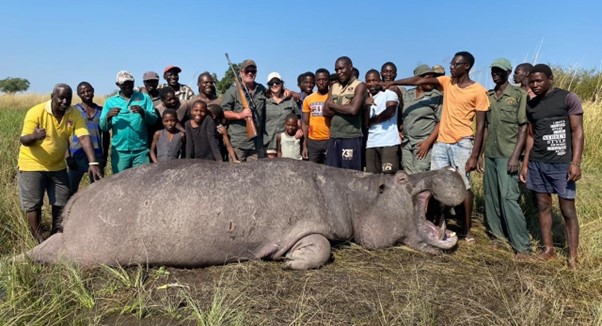
Measuring a Trophy Hippo Bull
A Hippo trophy can be measured either by making use of the Rowald Ward standard or applying the SCI measurements and scorecard.
The tusks of the harvested Hippo first need to be removed from the skull of the Hippo before trophy measurements can be taken.
Hunting Hippo with a Compound Bow
Yes, Hippo can be hunted with a compound bow. Every African country has separate rules and regulations with hunting Hippo with a bow, so it is suggested that the hunter checks with their Hunt Broker.
The suggested minimum requirements when bow hunting Hippo in Africa would be as follows:
- A draw weight of 95 pounds
- An arrow weight of 800 grains
- A fixed blade with a two-inch cutting width
When bow hunting Hippo in Africa, the hunter can expect a short distance of between twenty and forty yards.
Shooting a Hippo when Bow Hunting
A hippo’s heart is large and can be reached when the Hippo is standing in the broadside position. Aim right behind the shoulder (not on the shoulder) in line with the front leg. The bow hunter will want to place the arrow one third of the way up from the bottom of the chest to the height of the back.
A direct hit with good penetration will result in a heart/lung shot which will ensure that the Hippo humanely expires.
African Hippo hunts and a typical Safari Day
Hippos can be spotted either in the water, or if lucky enough on land. Hippo hunting will commence early in the morning where the waterways will be scouted either by making use of a small boat, or by walking the banks of the estuaries and waterways.
Once a potential Trophy Hippo bull is spotted, the members of the hunting safari will proceed to stalk the Hippo slowly and cautiously with the intent of lining up for the perfect shot.
The below image gives a clear indication as to what the hunter can expect when Hippo hunting in Namibia. It shows areas of the Hippo hunting grounds with visibility. When entering the reed beds in the swamps, that is a totally different scenario, tall reads, low water ways filled with giant Nile crocodiles, all the makings of a perfect African hunting adventure.
Conclusion: Hippo hunts in Africa are truly remarkable making dream hunting memories to last a life time.
If you are interested in booking African Hippo hunts, please email: info@gamehuntingsafaris.com
Author: PC van Wyk
